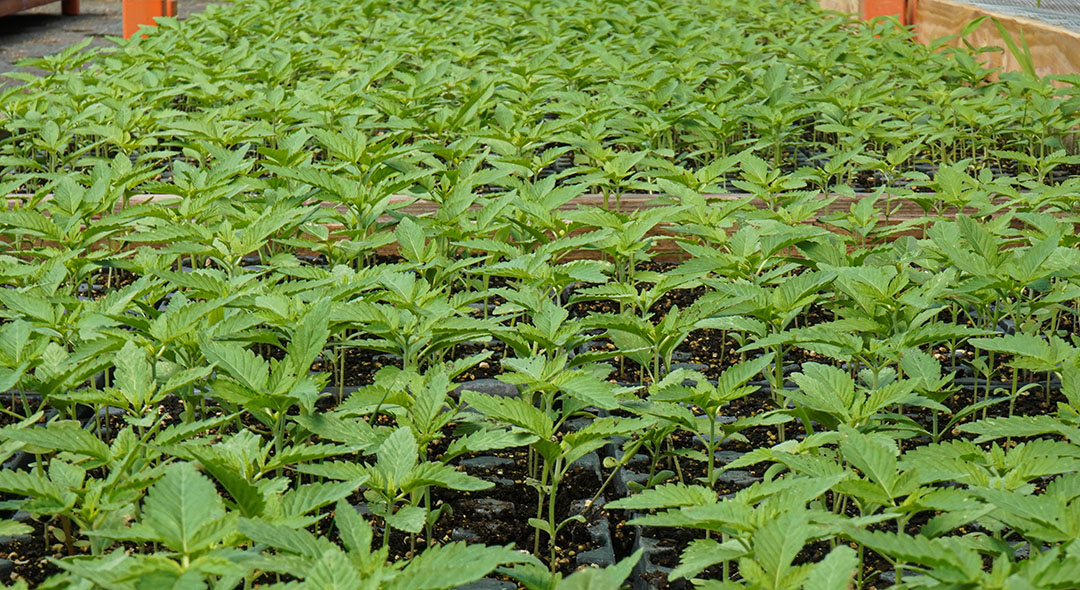A Quick Gist..
CBD can remain in your system for up to 48 hours, but there are many factors that can influence this time frame, including consumption methods, frequency of use, dose, individual metabolism (genetics), and much more. In this article we’ll discuss some of the most popular consumption methods and how they affect the duration of CBD in your system.
What is CBD?
If you’ve found this article, it’s likely you already know what CBD (cannabidiol) is. If this is your first time hearing about CBD, read our post “What is CBD? Quick Guide to Cannabidiol“.
Factors That Influence the Duration of CBD in Your System
Several factors can influence how long CBD remains in your system, including individual metabolism, dosage and frequency of use, the specific CBD product consumed, the method of consumption, genetic factors, the presence of food, and overall body composition.
How Often You Use CBD
Yes! The frequency of CBD use can impact how long it stays in your system. Regular and frequent use of CBD may lead to a buildup of CBD in the body over time, and may take longer to clear from your system compared to occasional or one-time use.
Method of Use
The methods you choose to use CBD will also impact how long it stays in your system. CBD products can have varying levels of concentration, bioavailability, and absorption rates.
- CBD Tincture: Using CBD tincture sublingually offers relatively high bioavailability, as the CBD is absorbed directly into the bloodstream through the capillaries under the tongue, allowing for quicker and more efficient absorption compared to other consumption methods. Tinctures can have a wide range of strengths, from as low as 250mg CBD, up to 5000mg CBD (see CBD Tincture).
- CBD Capsules: Ingesting CBD has a relatively low bioavailability, as the CBD must pass through the digestive system, resulting in a slower onset of effects and potentially reduced absorption into the bloodstream. CBD capsules provide a convenient and precise way to consume CBD. Each capsule typically contains a specific amount of CBD, such as 10mg, 25mg, or 50mg, making it easy to track your dosage.
- CBD Topicals: The bioavailability of topical CBD products is relatively low, as the CBD is primarily absorbed through the skin and works locally in the applied area, without significant systemic absorption into the bloodstream. CBD-infused creams, lotions, and balms designed for topical application often contain around 100mg to 500mg, and sometimes up to 1000mg of CBD per container (see CBD Lotion)
- CBD Edibles: CBD-infused edibles, such as gummies or chocolates, usually offer a pre-measured amount of CBD per serving. They typically range from 5mg to 25mg per piece, allowing for precise dosing and a flavorful CBD experience. The bioavailability of Edibles is similar to capsules, as the CBD must pass through the digestive system.
- CBD Vapes: Vaping CBD offers high bioavailability, as the CBD vapor is inhaled into the lungs, allowing for rapid absorption into the bloodstream. This method bypasses the digestive system, resulting in quicker onset of effects and higher levels of CBD available for systemic circulation. CBD vape carts often contain various CBD concentrations, such as 100mg, 250mg, or 500mg. It’s important to follow the manufacturer’s guidelines and consider your personal tolerance when using CBD vape products.
If you are a purist interested in consuming CBD (along with related minor cannabinoids) without a trace of THC included in it, then you must experience our fabulous CBD Wax!
Genetics
Enzymes involved in metabolizing CBD, such as cytochrome P450 enzymes, can vary in their activity levels among individuals due to genetic differences. This can affect how efficiently CBD is broken down and eliminated from the body. As a result, some individuals may metabolize and clear CBD more quickly, while others may have a slower clearance rate, impacting the duration CBD stays in their system.
Food
When was the last time you ate? It may surprise you how food can affect the duration in which CBD will remain in your system. Consuming CBD with a meal, especially one that contains fats, can enhance its absorption and prolong its presence in the system. The ingestion of food slows down the digestion and absorption process, allowing CBD to be gradually released into the bloodstream over a longer period. As a result, CBD may stay in your system for an extended duration when taken with food compared to when taken on an empty stomach.
How Much CBD You Take (dose)
The amount of CBD you take may have the most profound impact on how long it stays in your system. Generally, higher doses of CBD may result in a longer presence of CBD in your body. This is because larger quantities take longer to metabolize and eliminate from the system. However, this ultimately depends on the products you’re using, as some products may offer higher concentrations of CBD.
- Low Dose of CBD:
- A low dose typically refers to a smaller amount of CBD, usually ranging from 5 to 15 milligrams (mg).
- Low doses are often recommended for individuals who are new to CBD or those who are sensitive to its effects.
- Low doses of CBD may provide subtle effects, such as mild relaxation, stress reduction, or a general sense of well-being.
- People often use low doses for daily supplementation or to promote overall wellness.
- Medium Dose of CBD:
- A medium dose generally falls within the range of 15 to 30 mg of CBD.
- Medium doses are commonly used by individuals seeking more noticeable effects or for specific purposes, such as managing mild pain, improving sleep quality, or reducing anxiety.
- Moderate doses may offer a balance between therapeutic benefits and minimizing potential side effects.
- It’s important to note that individual responses can vary, so finding the right dose may require some experimentation and adjustment.
- High Dose of CBD:
- A high dose typically involves taking more than 30 mg of CBD, although there’s no universally defined upper limit.
- High doses are often used for individuals seeking potent effects or dealing with more severe conditions, such as chronic pain, epilepsy, or certain neurological disorders.
- High doses of CBD should be approached with caution and under the guidance of a healthcare professional, especially if using CBD alongside other medications.
- Some people may experience sedation or drowsiness with high doses, and it’s crucial to start with lower doses and gradually increase to assess personal tolerance and effects.
This chart may help you understand the potential duration CBD will remain in your system, depending on consumption method and dose:
| Consumption Method | Dose | Duration in Your System |
| Inhalation (Vaping) | Low | 1-3 hours |
| Medium | 1-4 hours | |
| High | 2-4 hours | |
| Sublingual (Tinctures) | Low | 4-6 hours |
| Medium | 5-6 hours | |
| High | 6-8 hours | |
| Ingestion (Edibles, Capsules) | Low | 6-8 hours |
| Medium | 8-10 hours | |
| High | 8-12 hours | |
| Topical Application | N/A | ~48 hours |
How Long Does It Take to Feel the Effects of CBD?
In general, sublingual methods, such as using CBD tinctures, can provide more immediate effects, often within 15 to 30 minutes. On the other hand, oral ingestion, such as consuming CBD edibles, may take longer, typically around 30 minutes to 2 hours for the effects to be noticeable. Factors like metabolism, dosage, and individual physiology can also influence how quickly the effects of CBD are felt. It’s important to start with a low dosage and gradually increase as needed to find the optimal timing and dosage for your personal response to CBD.
How Long Do CBD Effects Last?
The effects of CBD can last anywhere from 2 to 6 hours. Inhalation methods, such as vaping, may provide more immediate but shorter-lasting effects, while oral ingestion and sublingual methods tend to have longer-lasting effects. It’s important to note that individual experiences may vary, and finding the right dosage and frequency of use can help maintain the desired effects throughout the day.
Will CBD Show Up On A Drug Test?
CBD itself typically does not show up on standard drug tests that are specifically looking for the presence of THC or its metabolites. However, some CBD products may contain trace amounts of THC, the psychoactive compound in cannabis. If a CBD product contains THC within the allowable legal limits (0.3% or lower in the United States), it may potentially show up on a drug test. It’s essential to choose CBD products from reputable sources that provide third-party lab testing and ensure they are THC-free or contain only trace amounts to minimize the risk of a positive drug test.
What If I’m Breastfeeding?
When it comes to CBD consumption while breastfeeding, it’s crucial to exercise caution and consult with a healthcare professional. CBD can potentially pass into breast milk, and there is limited research available on its effects on infants. Due to the lack of comprehensive studies, it is generally recommended to err on the side of caution and avoid CBD products while breastfeeding to ensure the health and safety of both the mother and the baby. It’s always best to seek guidance from a healthcare provider who can provide personalized advice based on your specific circumstances.
In Conclusion..
There are a number of factors that can affect how long CBD stays in your system. We hope this article has provided you with enough information to make a decision that is right for you.
Shop CBD Products at Fern Valley Farms:
-
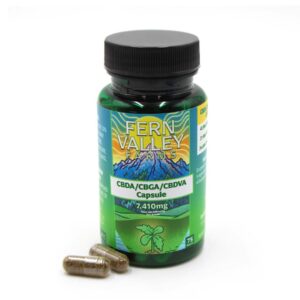 CBDA/CBGA/CBDVA Capsules$43.00
CBDA/CBGA/CBDVA Capsules$43.00 -
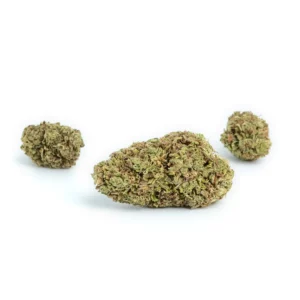 Vitality | CBDV Flower$11.00 – $465.00
Vitality | CBDV Flower$11.00 – $465.00 -
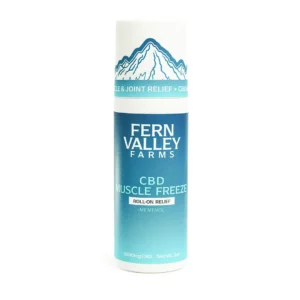 CBD Muscle Freeze | Roll-On$32.00 – $34.00
CBD Muscle Freeze | Roll-On$32.00 – $34.00 -
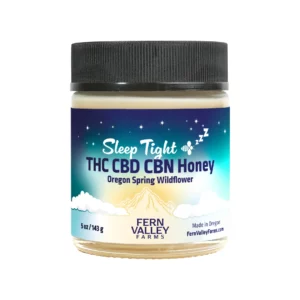 Sleep Tight | THC CBD CBN Honey$25.00 – $45.00
Sleep Tight | THC CBD CBN Honey$25.00 – $45.00 -
 CBD Massage Oil$16.50 – $32.50
CBD Massage Oil$16.50 – $32.50 -
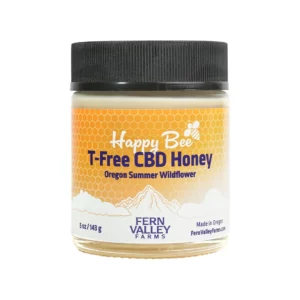 Happy Bee | T-Free CBD Honey$25.00 – $45.00
Happy Bee | T-Free CBD Honey$25.00 – $45.00
